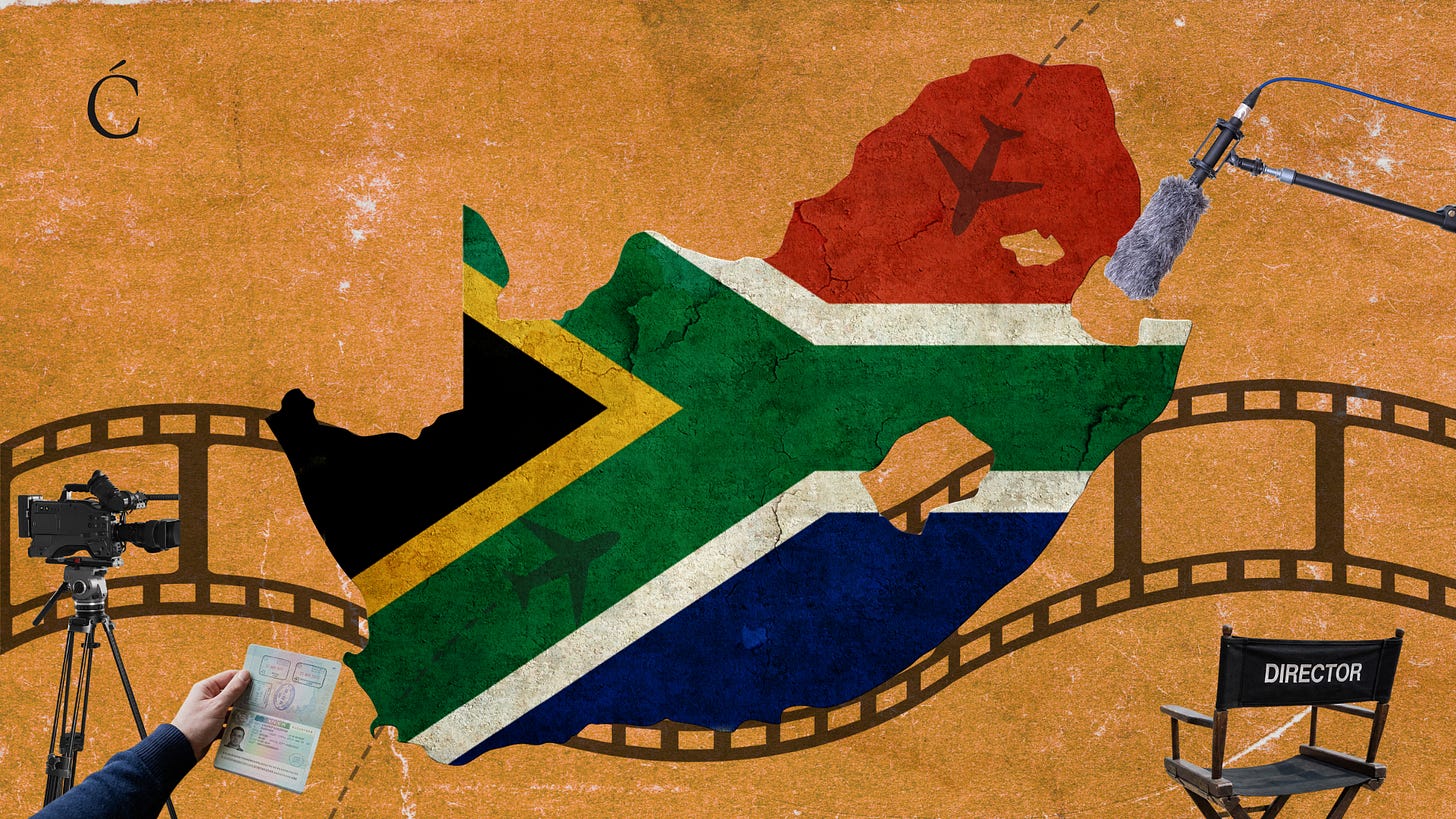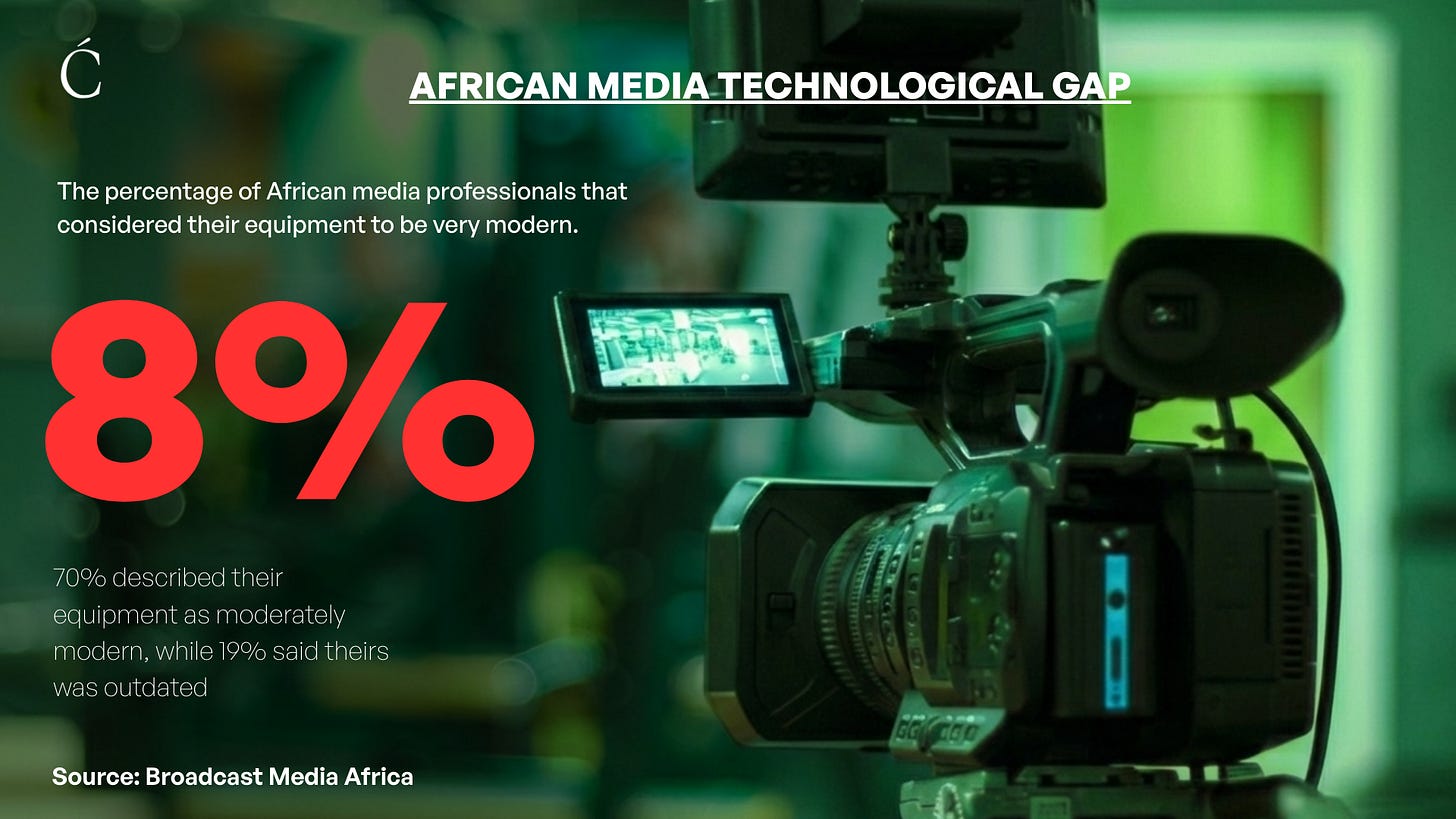South Africa’s 24-hour film visas + Morocco’s mission to power up its gaming industry
South Africa fast-tracks visas to court global filmmakers; Morocco doubles down on gaming as its next creative export.
Hello!
I have a quick favour to ask, and I’m counting on you not to disappoint. We’re about to hit a major milestone: 50,000 subscribers across all our publishing channels, and we’d love for our readers (that’s you!) to celebrate with us.
Please reply or comment telling us your favourite Communiqué story or why you read Communiqué.
That’s the favour. And by the way, don’t keep us a secret: tell your friends to sign up too. (Here is the link to do so.)
Now to this week’s Digest, we discuss:
South Africa’s new 24-hour visas for international filmmakers
Morocco’s push to make the gaming industry a core part of its economy
Centre Spread 🗞️
South Africa’s new fast-track visa system for creatives and filmmakers
South Africa’s Department of Home Affairs has officially launched a fast-track visa system for international film and creative professionals. The Department announced on November 13 that both local and foreign producer organisations can now submit Expressions of Interest (EOIs) for accreditation under the Screen Talent and Global Entertainment Scheme (STAGES).
The system was first introduced in July by the Minister of Home Affairs, Dr Leon Schreiber, as part of a broader effort to modernise South Africa’s immigration processes. According to Schreiber, STAGES was designed to replace the outdated, paper-heavy system that often left production companies waiting weeks or even months for visa approvals. He cited a Netflix production that was forced to relocate to Mexico after failing to secure the necessary visas for its crew—a move that, he noted, cost South Africa an estimated 400 million rand.
The department introduced a transparent scoring system to decide who gets access to the platform, assessing organisations on compliance, experience, economic impact, and local partnerships. Accredited companies will gain access to a streamlined, digital visa process for foreign cast, crew, and production staff, with approvals expected in as little as 24 hours.
The global film market is increasingly competitive, with countries such as Canada, New Zealand, and the UAE offering streamlined visa processes and tax incentives to attract studios. South Africa, already a popular filming destination for blockbusters such as Mission: Impossible, Resident Evil: The Final Chapter, and Escape Room, is betting that the move will help it retain its edge and attract more high-value productions.
Morocco sets its sights on the gaming industry
Over the past decade, Morocco has cemented its reputation as a rising force in African sports. It has hosted major tournaments, invested in infrastructure, and nurtured homegrown athletes to compete on the continent’s biggest stages. Now, the government is channelling that same ambition into a new arena: video gaming and esports.
On November 13, the Ministry of Youth, Culture and Communication, in partnership with the national fund manager Caisse de Dépôt et de Gestion (CDG) and its investment arm CDG Invest, announced the launch of the Gamification Lab program. The initiative aims to “encourage the emergence of a national gaming industry” by creating a platform to support Moroccan studios, boost local game development, and drive the domestic adoption of gaming solutions.
This move builds on earlier efforts by the Moroccan government to cultivate digital creativity. In collaboration with France, Morocco launched a Video Game Incubator program in March to support nine gaming startups and develop local talent. In May, the country announced initiatives to strengthen professional training in gaming-related fields, including the introduction of university programs in video game development and the establishment of three new vocational tracks: e-sport caster, e-sport streamer, and video game laboratory technician. It is also working on a $26 million project, the Rabat Gaming City, which would serve as a hub for the country’s gamers, developers, and enthusiasts.
These moves have been framed as efforts to address the country’s unemployment problem and also diversify its economy, which is mainly dependent on tourism, agribusiness and fertiliser production.
Morocco’s gaming industry currently generates around $500 million annually, according to government estimates, with ambitions to double that figure by 2030. The government believes it has a competitive advantage over other countries in the Middle East and North Africa (MENA) region. “Of all media businesses, gaming stood out for offering the best potential to establish ourselves as an African hub,” Nissrine Souissi, director of gaming industry development at the Ministry of Youth, Culture and Communication, said to reporters in June 2024.
Crunch Time 📈
Curiosity Cabinet
This week’s Communiqué essay examines how Nigeria’s new tax laws, which take effect on January 1, 2026, affect local creators and asks what must be in place for fair and proper taxation of the creator economy.
In this week’s edition of Offscript, Njoki Muhoho, the former director of Multichoice Talent Factory East Africa, shares how she charted her course to become one of East Africa’s most respected film and television figures.
More than a third of journalists now identify as a ‘creator journalist’. (Pair with Communiqué 30 for more context)
Here are the events happening across Africa’s creative economy this weekend and next week:
November 24-26: AfCFTA’s inaugural Creative Connect Africa Forum and Festival holds in Accra, Ghana
November 28: West Africa’s largest creative industry conference, NecLive 2025, holds in Lagos, Nigeria
November 28-30: CTIAF AnimJam 2025, a weekend “hackathon-style” event by Cape Town International Animation Festival, holds in Cape Town, South Africa.
November 28-30: The Creators Fest: After Dark, a networking and inspiration evening for female creatives and entrepreneurs in South Africa, holds in Cape Town, South Africa
Explore more of Africa’s creative economy in one place. Communiqué’s African Creative Economy Database tracks 1,000+ companies, events, investors, and government actors across the continent.
Thank you for reading Communiqué! Help us give Africa’s media and creative industries the coverage they deserve by donating here.
That’s it for this week’s Digest. See you next week.




